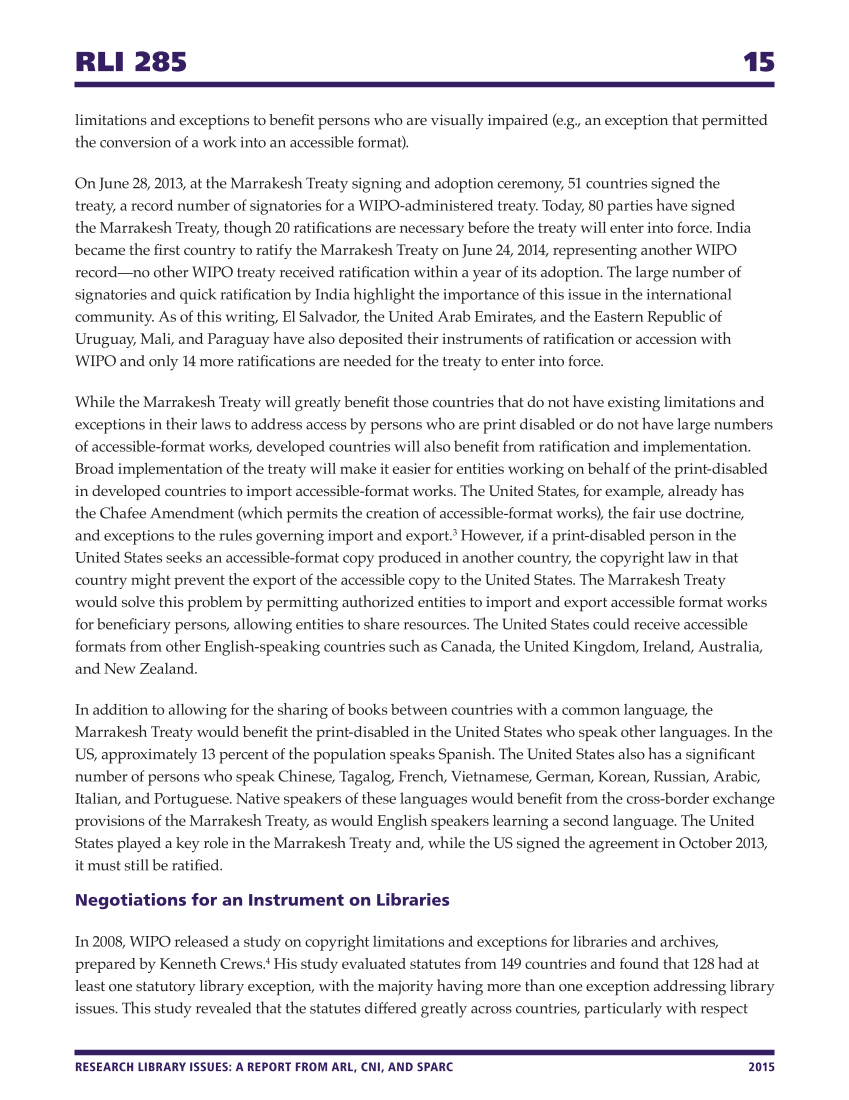RLI 285 15 RESEARCH LIBRARY ISSUES: A REPORT FROM ARL, CNI, AND SPARC 2015 limitations and exceptions to benefit persons who are visually impaired (e.g., an exception that permitted the conversion of a work into an accessible format). On June 28, 2013, at the Marrakesh Treaty signing and adoption ceremony, 51 countries signed the treaty, a record number of signatories for a WIPO-administered treaty. Today, 80 parties have signed the Marrakesh Treaty, though 20 ratifications are necessary before the treaty will enter into force. India became the first country to ratify the Marrakesh Treaty on June 24, 2014, representing another WIPO record—no other WIPO treaty received ratification within a year of its adoption. The large number of signatories and quick ratification by India highlight the importance of this issue in the international community. As of this writing, El Salvador, the United Arab Emirates, and the Eastern Republic of Uruguay, Mali, and Paraguay have also deposited their instruments of ratification or accession with WIPO and only 14 more ratifications are needed for the treaty to enter into force. While the Marrakesh Treaty will greatly benefit those countries that do not have existing limitations and exceptions in their laws to address access by persons who are print disabled or do not have large numbers of accessible-format works, developed countries will also benefit from ratification and implementation. Broad implementation of the treaty will make it easier for entities working on behalf of the print-disabled in developed countries to import accessible-format works. The United States, for example, already has the Chafee Amendment (which permits the creation of accessible-format works), the fair use doctrine, and exceptions to the rules governing import and export.3 However, if a print-disabled person in the United States seeks an accessible-format copy produced in another country, the copyright law in that country might prevent the export of the accessible copy to the United States. The Marrakesh Treaty would solve this problem by permitting authorized entities to import and export accessible format works for beneficiary persons, allowing entities to share resources. The United States could receive accessible formats from other English-speaking countries such as Canada, the United Kingdom, Ireland, Australia, and New Zealand. In addition to allowing for the sharing of books between countries with a common language, the Marrakesh Treaty would benefit the print-disabled in the United States who speak other languages. In the US, approximately 13 percent of the population speaks Spanish. The United States also has a significant number of persons who speak Chinese, Tagalog, French, Vietnamese, German, Korean, Russian, Arabic, Italian, and Portuguese. Native speakers of these languages would benefit from the cross-border exchange provisions of the Marrakesh Treaty, as would English speakers learning a second language. The United States played a key role in the Marrakesh Treaty and, while the US signed the agreement in October 2013, it must still be ratified. Negotiations for an Instrument on Libraries In 2008, WIPO released a study on copyright limitations and exceptions for libraries and archives, prepared by Kenneth Crews.4 His study evaluated statutes from 149 countries and found that 128 had at least one statutory library exception, with the majority having more than one exception addressing library issues. This study revealed that the statutes differed greatly across countries, particularly with respect























